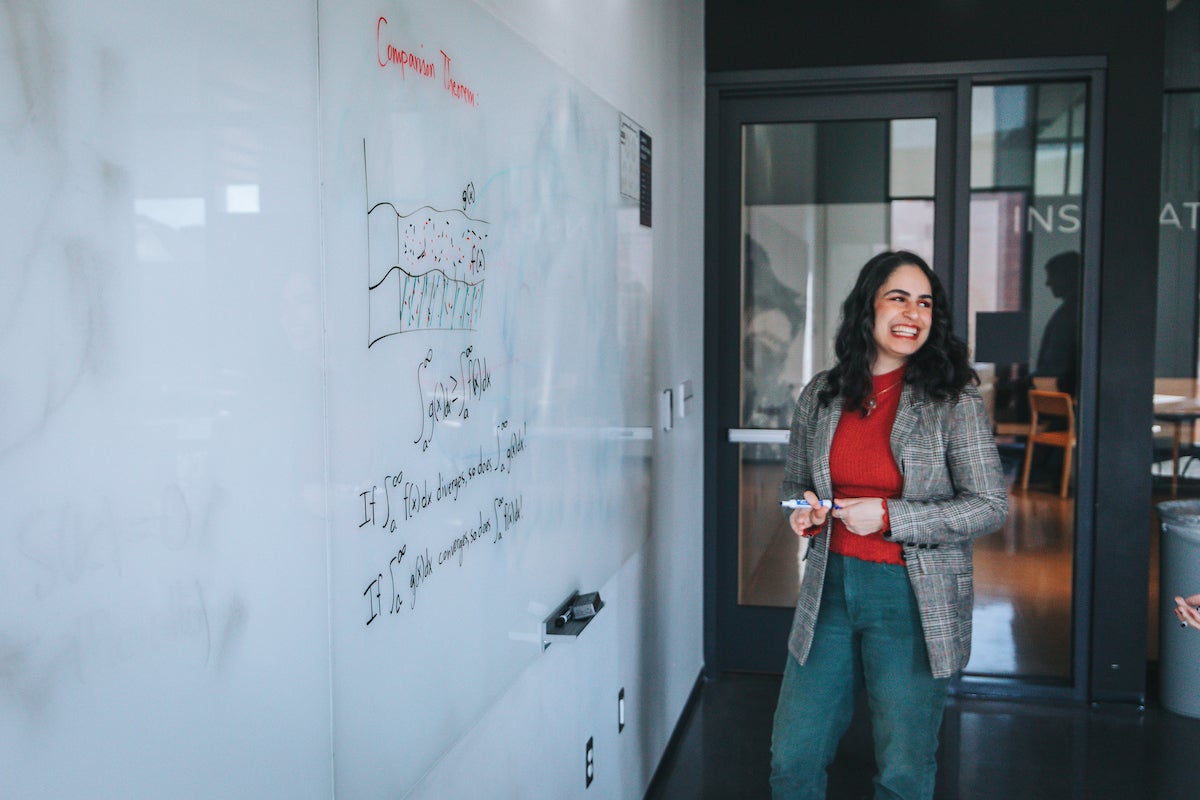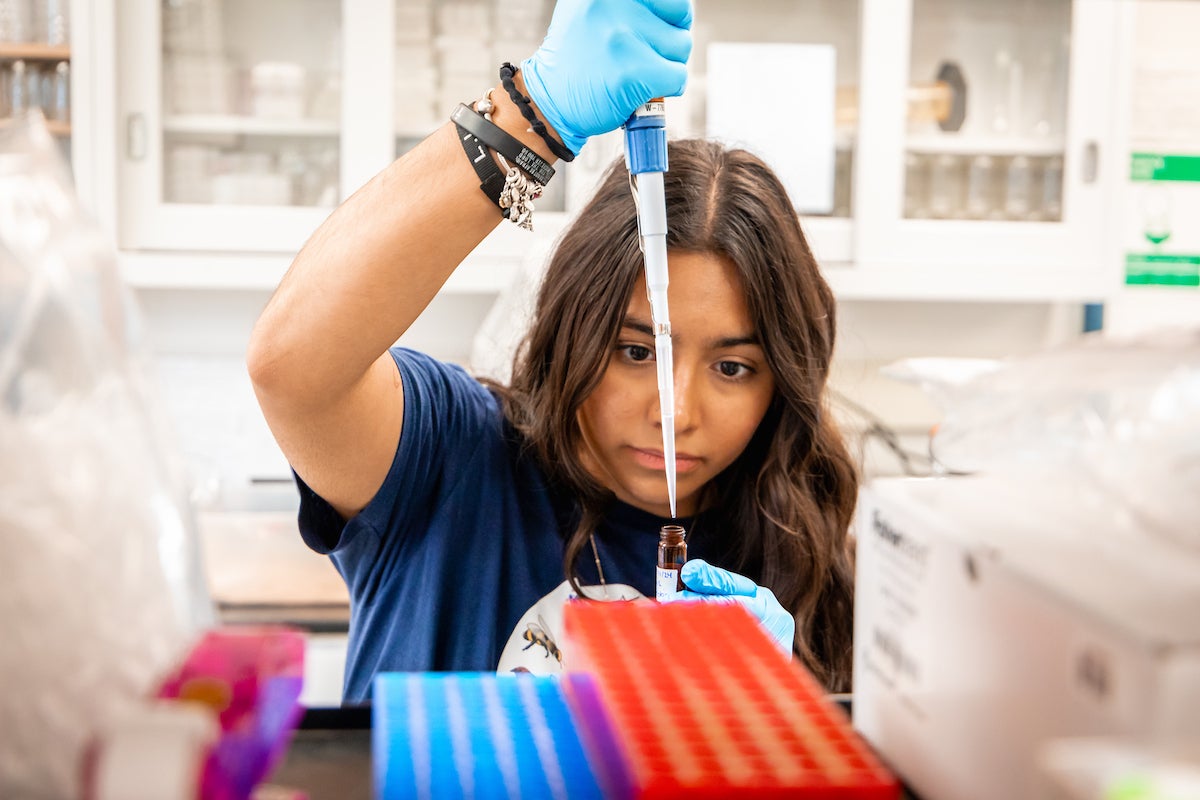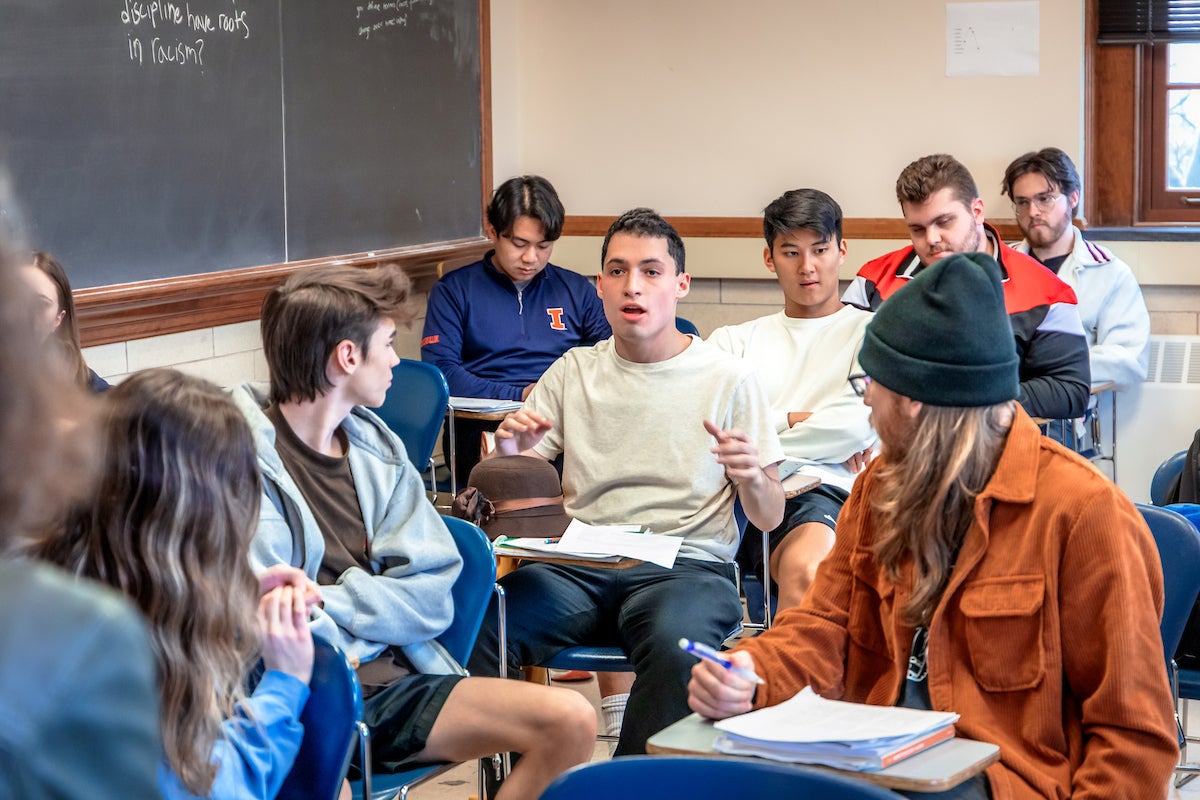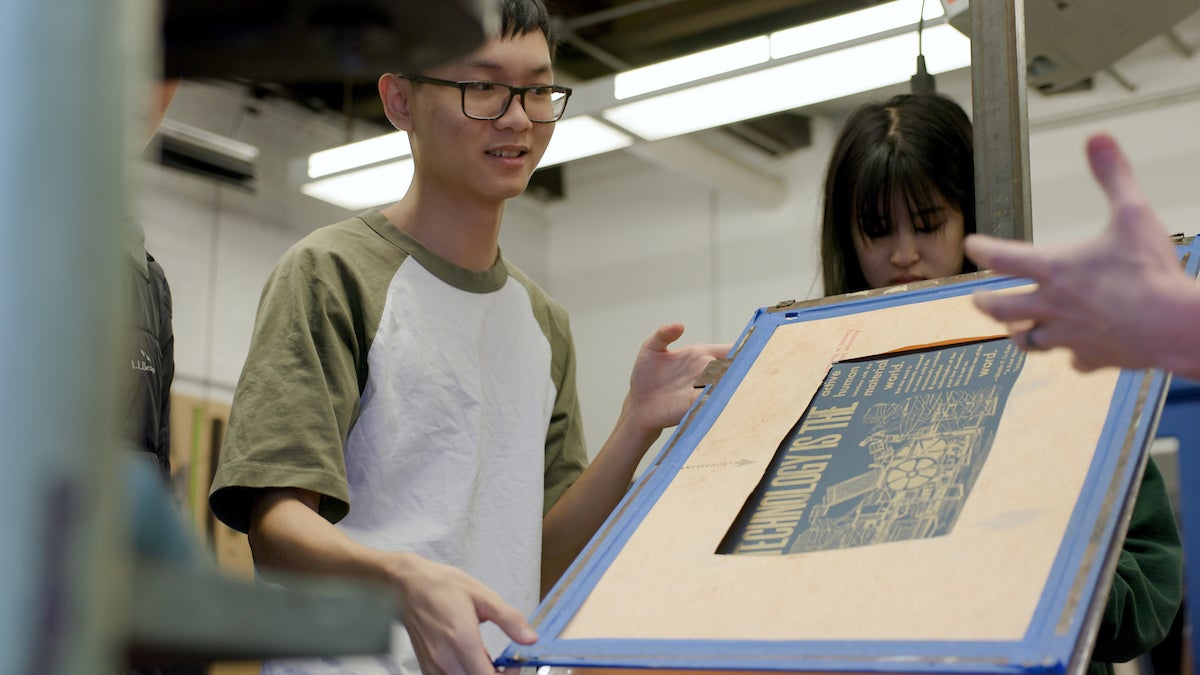What is a liberal arts and science degree?
As you’ve been completing your college search and considering majors, you may have asked yourself “what is liberal arts?” or “what is a liberal arts degree?’ A liberal arts degree is a field of study in the humanities, arts, and social sciences. The Encyclopedia Britannica defines the humanities as “those branches of knowledge that concern themselves with human beings and their culture or with analytic and critical methods of inquiry  derived from an appreciation of human values and of the unique ability of the human spirit to express itself.” Popular humanities majors within the College of LAS at the University of Illinois include English, history, and philosophy—majors that pertain to the human condition.
derived from an appreciation of human values and of the unique ability of the human spirit to express itself.” Popular humanities majors within the College of LAS at the University of Illinois include English, history, and philosophy—majors that pertain to the human condition.
According to Merriam-Webster, the social sciences deal with “the institutions and functioning of human society and with the interpersonal relationships of individuals as members of society.” The largest major within the College of LAS, psychology, sits within the branch of the social and behavioral sciences. Other popular social science majors are economics and political science.
Merriam-Webster defines the natural sciences as “any of the sciences (such as physics, chemistry, or biology) that deal with matter, energy, and their interrelations and transformations or with objectively measurable phenomena.” The natural and physical sciences include majors such as astronomy, molecular and cellular biology, and chemistry. Other majors in the natural and physical sciences are integrative biology, atmospheric sciences, and geology.
When deciding what to study in college, “what can I do with a liberal arts degree?” is a commonly asked question. Read on to find out what you’ll learn as a liberal arts major and what you can do with your liberal arts education.
Why get a liberal arts degree?
There are many reasons to get a liberal arts degree. Since the liberal arts and sciences span a variety of disciplines, you’ll have plenty of majors to choose from. Interested in math and quantitative reasoning? Mathematics, statistics, and actuarial science are all majors within the College of LAS. If you prefer more qualitative analysis and consider critical thinking an important skill, a humanities major such as English, history, or comparative and world literature could be a good fit. If you enjoy working with both numbers and words, some majors in the social and behavioral sciences often involve coursework where you’ll use both quantitative and qualitative skills. Consider majoring in economics or psychology.
An education in the liberal arts is a great way to discover what you’re passionate about—or to learn even more about what you know you’re passionate about. Once you discover what major or discipline best lines up with your interests, you can begin thinking about how you can apply the skills you’ll learn to possible career paths.
There are countless opportunities for students in the liberal arts and sciences. Most majors in the College of LAS require students to think critically, as critical thinking is a useful and important skill for success in the postgraduate world. As you use critical thinking for when you choose a major, your thought process will be similar when narrowing what jobs to apply to. You will also use critical thinking when the time comes to budget, and when you communicate with peers in the workplace.
Employers often look for the skills taught in a liberal arts curriculum: critical thinking, which is linked to problem-solving, and how to create a compelling argument using persuasive communication. You will learn how to hone these skills as a liberal arts major and highlight them to employers when you enter the job market.
 What you’ll learn
What you’ll learn
LAS alumna Payton Jarzyna of the Class of 2024 gives her insight into her experience as a liberal arts major. Read on to find out what skills Payton acquired and how her creative writing major prepared her for the future:
“As a creative writing major, I sometimes worried that I wouldn’t be able to find a job. I often found myself wondering: what can I do with a liberal arts degree? I had no idea how many options I would have as a senior. From management jobs to creative opportunities, thanks to the diverse liberal arts coursework I’ve taken, I have lots of positions to choose from. The organizational skills, critical thinking abilities, and public speaking expertise that I’ve gained have helped prepare me for the job force, and given me content to include on my resume and cover letters. With all the liberal arts classes I’ve taken, I feel confident interviewing and applying for jobs.
At the University of Illinois, gen ed coursework within the College of Liberal Arts & Science offers a solid foundation for developing professional skills. For example, CMN 101 - Public Speaking helped me become an engaging presenter. In the class, students had to write their own speeches and perform them in front of the class, which not only helped me refine my public speaking skills, but also helped me interview comfortably. Public speaking is a huge part of the job application process, and a major factor in job performance, so this class, along with other wonderful gen eds, helped me develop those skills significantly.”
 What can you do with a liberal arts degree?
What can you do with a liberal arts degree?
Outside of the workforce, there are also opportunities to put your liberal arts education to use and enrich the knowledge you’ve gained from it. If you’re still asking yourself, “what can I do with a liberal studies degree?”, you may want to consider graduate school or volunteering. Some liberal arts graduates attend graduate school to earn advanced degrees and continue their education. Sometimes, graduates may pursue a graduate degree related to their bachelor’s degree—or choose a different area of study to expand their knowledge and become more well-rounded. Others opt to do volunteer work usually related to their area of study.
Get a graduate degree
In certain industries such as education, employees may earn higher salaries if they’ve completed a master’s degree or a Ph.D. The College of LAS is proud to offer over 110 graduate-level majors and minors. Whether it’s English, atmospheric sciences, or communication, you will not be at a loss for options when it comes to choosing your advanced degree at LAS.
Make a difference
Volunteering can give you a competitive edge during the job search process, as you will have practical experience that makes you stand out from candidates who don’t. Common volunteering organizations Illinois graduates often join include the Peace Corps and AmeriCorps. Peace Corps and AmeriCorps volunteers can focus on anything from community health, agriculture, and environmental sustainability. Many Illinois grads are also Fulbright scholars and teach abroad. Whether you volunteer at home or abroad, the experience you gain from volunteer work can prepare you for the workforce or even graduate school should you choose to go either of those routes after volunteering.
Rewarding jobs for liberal arts majors
So, what jobs can you get with a liberal arts degree? The answer is that there are actually multitudes of jobs for liberal arts majors. Since the liberal arts and sciences are so diverse, so are the job prospects. The next time you find yourself asking “what can I do with a liberal arts degree?”, you’ll have an answer. Here are just a few examples of liberal arts major jobs that graduates land after finishing their degrees.
Public relations specialist
If you’re especially great at communication, public relations specialist could be a good fit. PR specialists create strategies to promote their clients. Sometimes, they will have to deal with crisis communications and must maintain their client’s positive image during these crises. The critical thinking and communication skills you may learn as a liberal arts major could prepare you for a career as a PR specialist.
Economist
According to the U.S. Bureau of Labor Statistics, economists work in various fields, “such as business, health, and the environment.” An economist analyzes “topics related to the production, distribution, and use (consumption) of goods and services” (U.S. Bureau of Labor Statistics). As is common with almost all degrees in the liberal arts and sciences, economics involves a great deal of critical thinking. Not only do economists collect and analyze data, but they also conduct research on topics they are assigned to, such as policy/laws, healthcare, and the labor force. Using their research and knowledge, economists can consult business owners, lawmakers, and various other groups on how to adjust their policies in order to increase profits and productivity, or the effect economic policies have on laws and regulations (U.S. Bureau of Labor Statistics). If you’re looking for a career that spans a diverse set of fields and want to flex your critical thinking and problem-solving skills, becoming an economist could be a great fit!
Writer
Wondering what jobs you can get with a liberal arts degree? Words are everywhere, from billboards, to emails, to social media posts, and there are plenty of opportunities to write for a living. Advertising agencies offer copywriting roles, which are awesome opportunities to engage with people through writing. Many companies have copywriter openings where you can write scripts for advertisements, social media captions, body copy, taglines, and more. There are also opportunities to write in journalism jobs, editing jobs, or anything in the communications field that requires writing skills. Whether it’s proofreading, writing news stories, or drafting marketing emails, there are positions for writers.
Insights from LAS students
This summer, Payton completed a copywriting internship with a creative branding agency in Chicago. “My creative writing coursework taught me the skills needed to craft an engaging cover letter and a polished resume to stand out as a candidate,” said Payton. She continues: “I always looked forward to the brainstorming process in my internship, where my experience in writing workshops helped me contribute to generating new ideas and giving feedback. Without a doubt, being a liberal arts student has given me thorough preparation for my career. You can do a lot with a liberal arts degree, meaning communications, business, public relations, and more.”
According to Payton, “If you’re worried about finding a job, you can always stop by the LAS Career Services Center in Gregory Hall. The staff can help you refine your cover letter and resume, as well as give you interview tips. Looking for a job doesn’t have to be difficult for liberal arts students.”
Get Your liberal arts degree at Illinois
If you’re looking for a field of study with plenty of majors in a diverse set of disciplines that will teach you soft skills that employers look for, consider applying to the College of Liberal Arts & Sciences at the University of Illinois. You will join a diverse community of driven students, and you’ll be able to explore what you’re curious about. At the College of LAS, passion, curiosity, and experiences matter. Apply today to give way to your curiosities!